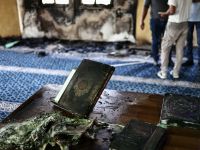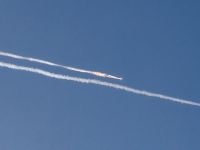The United States is seeking to boost cooperation with the oil-rich Gulf Arab monarchies against the risks of weapons of mass destruction posed by neighboring Iraq and Iran, Pentagon officials said Saturday.
"I will encourage the Gulf States to continue the greater cooperation of looking at threats through a more regional perspective," said US Defense Secretary William Cohen, who is on a Middle East tour.
"They are starting to focus now on how they can share through exercises, techniques, some technologies and cooperation in humanitarian types of efforts," Cohen said.
Launched in 1998, the Cooperation Defense Initiative (CDI) program is designed to "educate countries and to help them prepare," Pentagon spokesman Ken Bacon explained to reporters.
Under the program, countries share an early-warning network and skills in "consequence management" on how to deal with casualties and train experts in detection of threats.
The United States accuses Iraq of having embarked before the 1991 Gulf War on secret programs to develop atomic, biological and chemical (ABC) weapons and of continuing its research after the conflict over Kuwait.
Baghdad, which remains under UN sanctions linked to its disarmament, insists its banned weaponry was eliminated by UN arms inspections between 1991 and 1998, and it refuses to allow the return of inspectors in defiance of UN resolution 1284.
According to the Pentagon, Iraq worked hard on developing lethal bacteriological agents such as anthrax and nerve gases.
Turning to Iran, Cohen has since he started his tour in the Gulf State of Bahrain pointed out that an improvement in ties between Washington and Tehran remains conditional on three factors.
The United States wants the Islamic Republic of Iran to stop undermining the Arab-Israeli peace process, to halt its alleged support for terrorism and stop seeking to acquire weapons of mass destruction.
Bahrain, Egypt, Jordan, Kuwait, Oman, Qatar, Saudi Arabia and the United Arab Emirates take part in the CDI program.
Pentagon officials said similar cooperation exists with Israel, "whose programs are very advanced," and with Asian countries.
Intelligence, computer simulation of possible bacteriological and chemical attack, and planning to limit civilian losses in a devastating attack all form part of the multi-faceted program.
The regional initiative, whose cost has not been disclosed, "does not show dramatic purchasing results," Bacon said, stressing it was an effort to combat a common threat.
The tasks are shared out: while the US State Department helps to prepare the police, fire and health services of Arab countries, the Pentagon cooperates with the military.
Mock terrorist attacks were staged last year in the United States as part of the training program, said Bacon.
Ironically, a body of the US Congress, the General Accounting Office (GAO), earlier this week accused the United States itself of not being fully prepared in its military exercises.
"The military services should require realistic chemical and biological defense training in exercises that adhere to 'realistic war-time scenarios,'" the GAO said in a report -- MUSCAT (AFP)
© 2000 Al Bawaba (www.albawaba.com)







